AU President Neil Kerwin presented an honorary degree to Myanmar politician and democracy activist Aung San Suu Kyi, which was first awarded to her in 1997 but accepted by her late husband Michael Aris when Suu Kyi was under house arrest in Myanmar.
Members of the D.C. Metro area Myanmar community filled the bleachers in Bender Arena on Sept. 20 to see Suu Kyi, who is on a 17-day tour of the United States. Suu Kyi, daughter of the late Myanmar leader Aung San, gained widespread recognition as an opponent of the Myanmar government, leading to a lengthy political imprisonment and the banning of her political party.
Suu Kyi’s tour, which follows her release from custody in 2010, brought her to an award ceremony and a meeting with President Barack Obama on Wednesday before her speech at AU.
“In 1997, we paid tribute to one of the world’s most prominent living symbols of human rights, freedom and democracy,” said Kerwin.
Kerwin spoke of Suu Kyi’s 15 years under house arrest and the political struggle that culminated in her election to Myanmar’s lower legislative house and the success of her party, the opposition National League for Democracy.
“We’ve been preparing for 20 some-odd years,” said Suu Kyi.
Suu Kyi’s speech began in English, while the majority was spoken in the Myanmar language. She urged the members of various ethnic communities within Myanmar to unite and consider themselves as one people, with mutual respect and understanding for each other.
Suu Kyi stressed a need for Myanmar-Americans to continue to support their home country, saying that the issues facing Myanmar today are not merely political but extend to all aspects of life, including the education and healthcare systems and the nation’s aging infrastructure.
About 20 Buddhist monks greeted Suu Kyi before the question and answer session, delivering a Buddhist chant to the audience as Suu Kyi knelt in prayer.
In a question-and-answer session that followed Suu Kyi’s speech, many questions concerning issues of citizenship status in Myanmar and the United States were raised. Myanmar does not allow dual citizenship, and many immigrants from Myanmar are not sure how to return now that they have become U.S. citizens, said Suu Kyi.
Suu Kyi said that as Myanmar continues its political transition, various laws governing matters of citizenship must be examined in order to help those who have left Myanmar.
“I believe in my country,” Suu Kyi said in the Myanmar language. “I believe we can achieve democracy, but you have to start with [a] genuine mind to improve. If everyone looks at one another with doubt, how can we achieve improvement? That’s why we are going to cooperate with other parties to promote democracy.”
Contributing writer Thin Zar Oo provided translation of the event for The Eagle.
Video courtesy of University Communications & Marketing
news@theeagleonline.com





